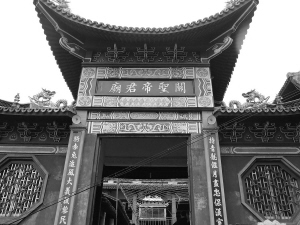Emperor Guan Temple and festivals and customs in Wenling
chinadaily.com.cn | Updated: 2019-02-19
Print Print
Emperor Guan Temple in Muyu town, Wenling, Taizhou, Zhejiang province [Photo/taizhou.com.cn]
In ancient times, the titles of Marquis and Duke were granted to Guan Yu posthumously who was then called Guandi (Emperor Guan) or Guangong (Lord Guan) by followers, and worshiped in temples scattered everywhere.
Taizhou is no exception to the custom. Emperor Guan Temples exist in all parts of Wenling such as Chengguan town, Xinhe town, Songmen town, Ruoheng town, Zeguo town, Shizhan town, Shiqiao town, and Dalyu town.
The Emperor Guan Temple at Chengguan town in Wenling is the most famous, dating back to the Ming Dynasty (1368-1644). After being burnt down in the ninth year of Emperor Jiaqing's reign in the Qing Dynasty (1644-1911) with only its rear hall and main entrance left, it was rebuilt in the 20th year of Emperor Jiaqing’s reign and renovated in the seventh year of Emperor Daoguang's reign. The construction was funded by the government and the public. As Lord Guan was esteemed as a Saint of War or God of War, the government and the military donated significant funds for its construction. Private citizens were also active in contributing funds. The temple took on a new and magnificent look of red and gold covering the main hall, wing halls, middle hall, decorated archway, stage and rear hall.
On the 13th day of the fifth lunar month every year, the anniversary of Emperor Guan's birth, grand temple fairs and festive activities are held in all parts of Wenling. According to the records, in the county seat on that day every year, young people were eager to get together at Emperor Guan Temple, becoming sworn brothers and performing the martial arts of scimitar or wrestling. A painting of Emperor Guan hung in the main hall of the temple with endless streams of his admirers and worshipers burning incense all day long. If it happened to rain that day, it was called the rain of Lord Guan's sharpening his broadsword, which was a propitious sign of a good harvest.
In Ruoheng town, plays were put on in the temple for quite a few days and nights to celebrate Lord Guan's birthday. The 13th day of the fifth lunar month was universally recognized as "Emperor Mercy Day". People clad in new clothes were freed from farm work; even the laborers employed by the wealthy got a one-day holiday with some fried beans and gift money. After a lunch of wheat cakes, which was the same in every household, people would have fun on the streets till nighttime.
On that holiday day most of the families would try to bring pleasure to the children by giving them fried beans and gift money, and all the shops on the streets would be open. The houses were decorated with lanterns and other ornaments, and the bustling streets were crowded with people in colorful clothes enjoying various entertaining activities such as shopping and viewing magic tricks or peep shows. Competitions between the plays put up at two different halls attracted throngs of audiences with various traditional activities adding more all-around fun. Gradually, the day was observed as a festival and a custom in Ruoheng town.

